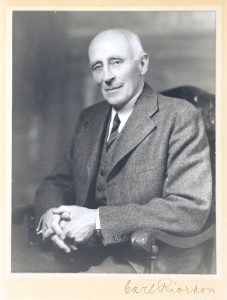Libera, me , Domine,
‘Tis a vast economy,
Wading off a siege of cares,
Shrinkage, over-head, repairs;
Then to gain the utmost skill,
With a flourish of the quill,
From too flatulent a plea,
Libera me, Domine
Continue reading
Monthly Archives: May 2005
IN TRIBUTE: The Riordon Paper makers
John Riordon: 1833 – 1884
Charles Riordon: 1848 – 1931
Carl Riordon: 1876 – 1958
WITH THE DEATH in Montreal on June 14, 1958 of Charles Christopher (Carl) Riordon there came to an end an epoch which is without parallel in the pulp and paper industry of Canada.
Continue reading
Charles Riordon: Pioneer Manufacturer and Philosopher
 He had great faith in human nature.
He had great faith in human nature.
He fully believed that most persons were honest and dutiful and capable of many sorts of work.
He urged emancipation from superstitions and appetites.
His strength and solidity were based on a strong sense of humour and a comprehensive philosophy of life.
He had no strong desire for external possessions, but he possessed his own soul and had no demons.
He had great faith in his own convictions, and while not given to dispute, he was not inclined to conciliate opinion.
He was rich in friends and enjoyed life with them as he went, so that when he lost, a friend by death he did not seem to have any vain regret for neglect to give all he could while they were alive.
Charles Riordon was born on November 28th, 1847, in the Village of Bally Bunion, County Kerry, Ireland, the seventh child of Jeremiah Riordon, who had been a medical offiver in the Navy from 1807 to 1821 serving on ships of the frigate class, including the “Bellerophon” during and after the Napoleonic Wars. The family came to Canada in 1850, lived at Weston Ontario for some seven years, and then moved to Rochester, N.Y., where Charles Riordon received his education.
Tea
A small poem which my grandfather enjoyed. It originally came from the “Silva” magazine.
Tea
From the faucets of the fountain, from the bottles of the bar,
I have sampled many gargles, ‘most as many as there are,
But the one that’s first and foremost, if you put it up to me,
Is a steaming cup of ashes, swamp-juice, soot and tea.
At the take-off of the portage, when a man is damp with toil,
Heat and deer flies are forgotten when the tea comes to a boil.
In the silent winter’s muskeg, when the snow has blocked the trail,
Hope and faith and courage await the bubbling of the pail.
Propped with rocks beside the rapids, jabbed into the forest mould,
Ten thousand blackened tea sticks mark the campsites of the bold.
Fancy drinks may please the townsman, do to flirt with now and then,
But the silent places witness, tea’s the drink that’s drunk by men.
Anonymous
